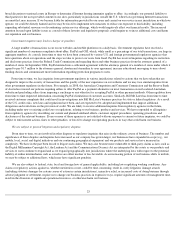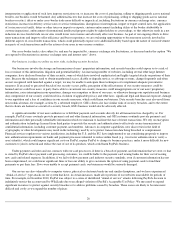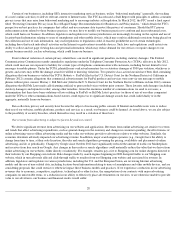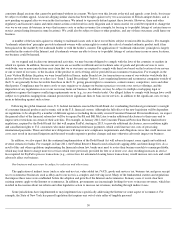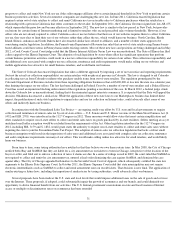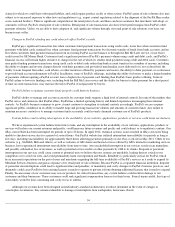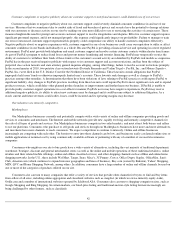eBay 2012 Annual Report Download - page 35
Download and view the complete annual report
Please find page 35 of the 2012 eBay annual report below. You can navigate through the pages in the report by either clicking on the pages listed below, or by using the keyword search tool below to find specific information within the annual report.
Bill Me Later's operations expose us to additional risks.
Risks associated with our reliance on an unaffiliated lender in providing the Bill Me Later service are discussed in more detail under the
caption “Bill Me Later's operations depend on lending services provided by an unaffiliated lender” above.
The Bill Me Later service relies on third-party merchant processors and payment gateways to process transactions. For the years ended
December 31, 2012 and 2011, approximately 62% and 69%, respectively, of all transaction volume by dollar amount through the Bill Me Later
service was settled through the facilities of a single vendor. Any disruption to these third party payment processing and gateway services would
adversely affect the Bill Me Later service.
The Bill Me Later service is offered to a wide range of consumers, and the financial success of this business depends on the ability of the
issuing bank of the Bill Me Later credit products to manage credit risk related to those products. The lender extends credit using Bill Me Later's
proprietary segmentation and credit scoring algorithms and other analytical techniques designed to analyze the credit risk of specific customers
based on their past purchasing and payment history as well as their credit scores. Based on these performance criteria, the lender may extend or
increase lines of credit to consumers at the point of sale. These algorithms and techniques may not accurately predict the creditworthiness of a
consumer due to inaccurate assumptions about a particular consumer or the economic environment, among other factors. The accuracy of the
predictions and the ability of the lender and Bill Me Later to manage credit risk related to the Bill Me Later service may also be affected by legal
or regulatory changes (e.g., bankruptcy laws and minimum payment regulations), competitors' actions, changes in consumer behavior and other
factors. The lender may incorrectly interpret the data produced by these algorithms in setting its credit policies, which may impact the financial
performance of the Bill Me Later service. In addition, economic and financial conditions in the U.S. may affect consumer confidence levels and
reduce consumers' ability or willingness to use credit, including the credit extended by the lender to consumers who use the Bill Me Later
service, which could impair the growth and profitability of this business.
Over the past several years, the volume of credit extended by WebBank (the financial institution issuing the Bill Me Later credit products)
has increased as we have continued to enable qualified buyers with a PayPal account to use Bill Me Later as a payment funding option for
transactions on eBay.com and on certain merchant websites that accept PayPal. We purchase the receivables relating to these consumer loans
extended by the issuing bank, and therefore bear the risk of loss in the event of loan defaults. Like other businesses with significant exposure to
losses from consumer credit, the Bill Me Later service faces the risk that account holders will default on their payment obligations with respect
to the consumer loans, making the receivables uncollectible and creating the risk of potential charge-offs. The rate at which receivables were
charged off as uncollectible, or the net charge-off rate, was approximately 4.81% and 4.46%, respectively, for the years ended December 31,
2012 and 2011. The nonpayment rate among Bill Me Later users may increase due to, among other things, worsening economic conditions, such
as a recession or greater austerity in the U.S., and high unemployment rates. Consumers who miss payments on their obligations often fail to
repay them, and consumers who file for protection under the bankruptcy laws generally do not repay their credit.
We fund the purchase of receivables related to Bill Me Later accounts through borrowings and domestic and international cash resources.
If we are unable to fund our purchase of receivables related to the Bill Me Later business adequately or in a cost-effective manner, the growth
and profitability of this business would be significantly and adversely affected.
Additionally, in providing the Bill Me Later service, we face other risks similar to those faced by PayPal described elsewhere in these Risk
Factors, including under the captions “Government inquiries may lead to charges or penalties” and “If our Payments business is found to be
subject to or in violation of any laws or regulations, including those governing money transmission, electronic funds transfer, money laundering,
terrorist financing, sanctions, consumer protection, banking and lending, it could be subject to liability, licensure and regulatory approval and
may be forced to change its business practices.”
PayPal's retail point of sale solutions expose us to additional risks.
PayPal has recently announced several retail point of sale solutions, including PayPal Here, which enables merchants to use a card reader
attached to a mobile device (or to scan cards and checks using the device's embedded camera) to accept payment, as well as in-store pilot
programs for new point of sale technologies, which have been rolled out to certain retailers in the U.S. As PayPal continues to expand into point
of sale transactions, PayPal will face even greater expectations from offline retailers regarding the reliability and availability of its systems and
services and correspondingly lower amounts of downtime. PayPal's retail point of sale solutions may also be targeted by fraudsters; given that
our fraud models are less developed in this area, we may experience increases in fraud and associated transaction losses as we adjust to
fraudulent activity at the point of sale. The manufacturing and sale of a hardware product (the PayPal Here device) exposes us to potential
product liability
33


